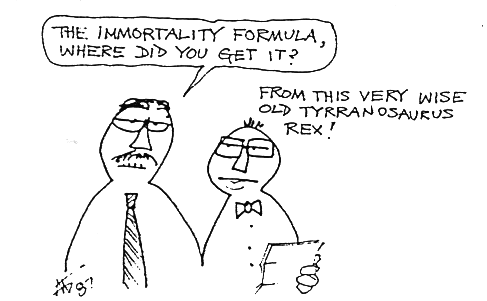The Evolutionary Theory of Ageing
The evolutionary approach suggests that the reason for ageing, and subsequent death, is, simply put, a cost saving measure. As an organism spends more time alive, there is a higher chance of something external (like disease or physical accident) killing it. Eventually something will kill the organism. In terms of resources, it's actually futile for the body to continue maintaining itself after it has reproduced. Enter ageing. After passing the point in its life where it is most fertile and completed its responsibility of child rearing (which in humans is around thirty, which oddly enough is when we start to age), an organism will start to age through processes triggered by its own genes.
Like the majority of theories related to evolution, it's all about survival. We only begin to age once we can no longer breed. Once we have created offspring, our usefulness is outlived. Thusly, our bodies start to die, so to not waste resources staving off the inevitable for a few years. It's harsh but morbidly utilitarian.
Why won't I be talking more about this theory? Well for one, it's more of an overarching theory on "Why we age?" as opposed to "How we age?". A lot of the other theories of aging that I have previously talked about could actually be the "how" to the "why" of the evolutionary theory. As interesting as the evolutionary theory might be, it doesn't present an awful lot of avenues to becoming immortal.
Autoimmunity and Ageing
As its name might suggest, the autoimmune theory of ageing suggests that the mistakes of our own immune system cause damage to our bodies over time. The term "autoimmunity" refers to our immune system, which includes our white blood cells, attacking the cells of our body for a variety of reasons. Normally, immune cells that are autoimmune would be destroyed by the body when they were intially produced. However, some of these cells might escape destruction and go on to cause damage to tissues around the body.
The theory indicates that autoimmune damage to specific tissue, such as the thyroid gland, might be responsible for the effects of ageing. The thyroid produces a large number of hormones responsible for growth and maintence of the body. If the thyroid were to be damaged by autoimmune action, the production of these hormones could be interuppted. The idea is that, over time, the increase in autoimmune cells and damage to the thyroid and other tissues results in the body no longer producing the correct hormones to keep us alive. As a result, the body starts breaking down, so on and so forth. AGEING.
The trouble with this theory is the whole "cause or symptom" dilemma which turns up far too often in biology. Whilst some maintain that the increase in autoimmune cells is a result of build-up over time, others suggest that the increased production is the result of another theory of ageing, such as the telomeres theory, or the mitochondrial theory. Some even suggest that the autoimmunity seen in elderly patients is infact just an oppotunistic disease that takes advantage of aged patients. Because of this, it feels ineffectual to attack autoimmunity as the cause of ageing, but better to aim straight for the cause.
Accumulative Waste Theory
The cells are often compared to tiny factories within the body, and that's a pretty apt description. There's a hundred different metabolic cycles all producing a plethora of different substances (and I should know, I've spent the last three years learning about them). Unlucky for us, then, that these processes often result in the production of unwanted chemicals, which tend to be toxic. Under normal circumstance, the body is rid of these byproducts through yet more metabolic cycles. However, the cycles aren't perfect and some of these waste products can be left over. Over time, these products can build up and cause damage to the body tissues. What does that sound like? AGEING!
You might notice a similarity between this theory and the mitochrondrial theory, by which I mean this theory basically IS the mitochrondrial theory of ageing, but with the words "reactive oxygen species" replaced with "toxic substances", and "mitochondria" with "cells" Essentially, the accumulative waste theory is a sort of more general mitchondrial theory of ageing, accusing the cell, and by extension, organs, of producing harmful waste products.
So here we are then. We've taken a look at a variety of theories of ageing, explore how and why they function in the way the do. All that's left to do now is try to stop that from happening, which is what I will be talking about next time.
 |
| So get ready for several months of bad "elixir of life" jokes |
No comments:
Post a Comment